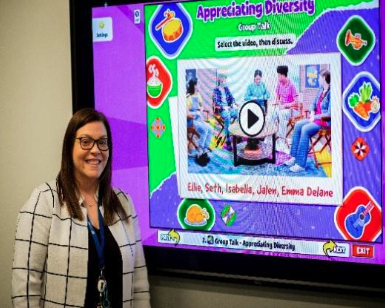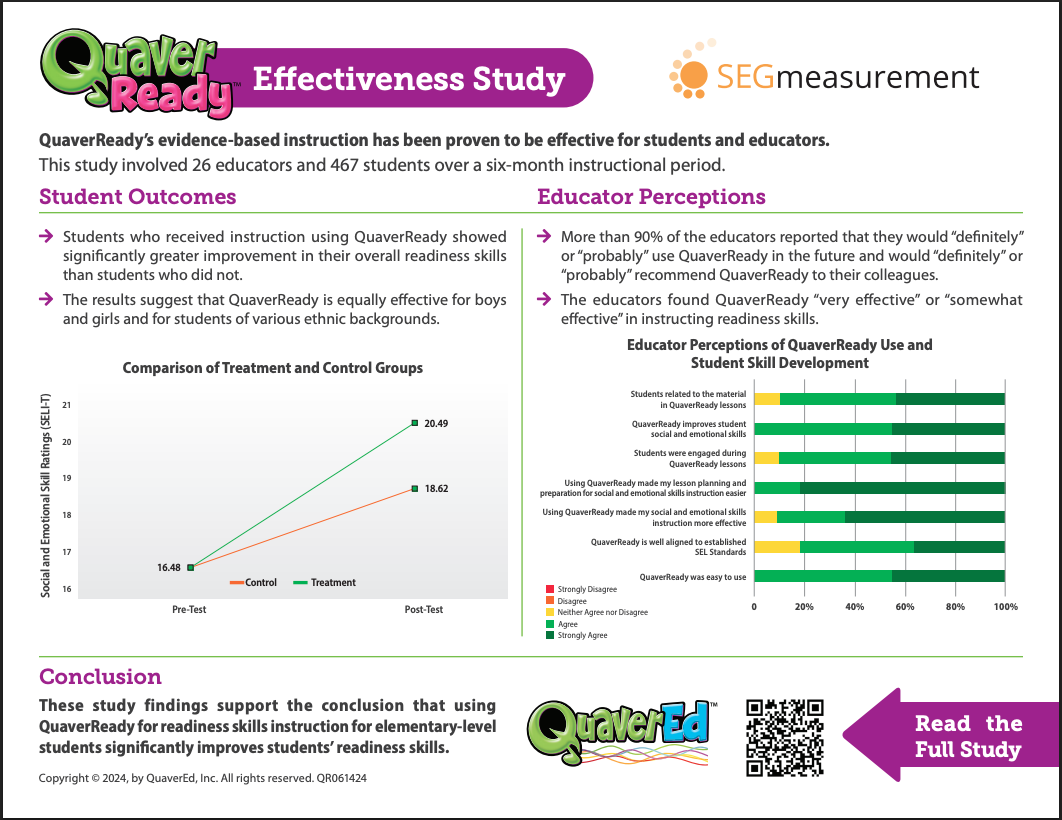Have you heard the Quaver original song, “He Had a Dream?” Did you know it was co-written by two fantastic Quaver music teachers? Today, Quaver’s Kristin Clark Taylor interviews David Gordon and Dwayne Bass of Albany Community Charter School to find out just how this important song came to life.
With Teamwork, Talent and the Right Tools, Here’s how it happens.
by Kristin Clark Taylor
***
History is Life.
For Quaver music teachers David Gordon and Dwayne Bass, Black History Month is way, way more than just history. For these two music teachers, black history is life.
To Gordon and Bass, black history doesn’t just live in libraries and it’s not just the study of what African-Americans did yesterday. It’s also the recognition of how all of these tremendous accomplishments influence our lives today — right here and now.
“Our school is about 80 percent African-American,” Gordon says of Albany Community Charter School, in Albany, New York, where he’s taught general music for four years.
“We’re in an underserved community — about 80 percent of the kids are on free and reduced lunch, and many face challenges — so there is definitely the need to celebrate and recognize Black History in a way that feels real and relevant. We were looking for a way to bring our history to life, especially in a more urban setting.”
Seek and Ye Shall Find.
As it turns out, Gordon and fellow music teacher Dwayne Bass, who also teaches at Albany Community Charter, did more than just “look” for a way to bring black history to life for their students: They found it … by creating it.
By combining their students’ love for the Quaver Music curriculum with their own collective knowledge of and passion for general music, the Dynamic Duo came together to make some music of their own – and the fact that they traveled almost a thousand miles to get it done makes the journey even more meaningful; the music, even sweeter.
The resulting project? A masterpiece in collaboration and creativity, made all the more moving and impactful with the incredible musical talent of the Quaver staff in Nashville, who’d issued the invitation to Gordon and Bass to visit their the company headquarters on iconic Music Row.
From that single visit, a song was born. And from that single song, a powerful, popular element of Black History was reborn —in the form of a lively song that celebrates the life and legacy of Dr. Martin Luther King, Jr. using chants, rap, melody, and music, appropriately entitled, “He Had a Dream.”
It’s the music.
When David Gordon speaks, pride sparkles in his voice. It rings and resonates and resounds with a message as clear and powerful as the musical notes he plays. His resounding message: I love my students!
Here is a teacher who guides his students to that rare intersection where the past, the present, and the future converge – to a place where “what was” intersects with “what is” and “what could be”— and when Gordon’s students arrive at this intersection, they are able to celebrate a piece of the past that they know belongs to them and to which they themselves are vitally connected.
Dr. King’s legacy, though, is also a history that belongs to all of us — black and white, rich and poor, young and old; it’s a piece of our collective past that has been reignited by the flame of Gordon’s passion, commitment, and collaborative spirit.
But it’s not just the passion and commitment that help reignite Dr. King’s life: It’s the music.
Music is what creates the emotion. Emotion is what facilitates engagement. Engagement is what facilitates learning. These are the very tools — and this is the very process — that Quaver provides. Tools, talent, and teamwork: The perfect combination.
Gordon agrees.
“We love the Quaver music program. It’s our #1 teaching resource,” he says. “My kids love Quaver because they understand it. They understand video gaming and technology, so they really relate to and appreciate the songs and lessons. The Quaver curriculum meets them on their level,” he says.
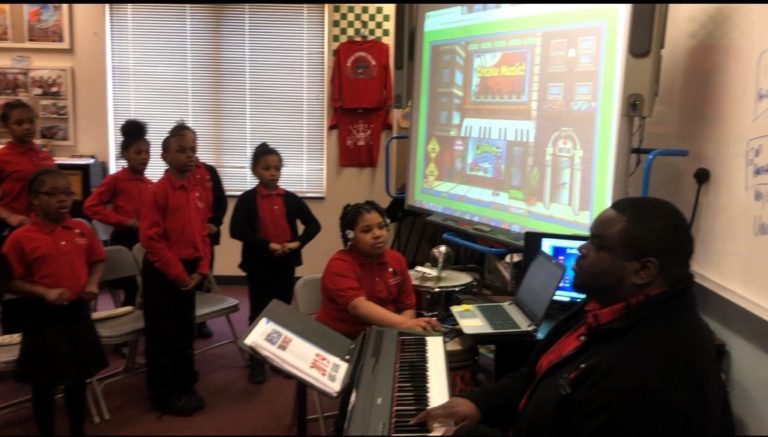
Quaver Teacher David Gordon in action! Photo Credit: David Gordon
“The Dream” becomes a Reality.
When Quaver sales representative Sean Smith invited Gordon and Bass to Nashville, the creative sparks began to fly, and “He Had a Dream” became a reality.
Jamming in the company’s state-of-the-art recording studio, the two teachers, alongside several members of the Quaver staff including Otto Gross, Dan Monaco, Sean Smith, and Sharon Cho, several of whom are accomplished musicians in their own right, collaboration was the definitely the name of the game.
Says Gordon of the session: “Dwayne threw out the chant, a bunch of us came up with the melody. I got on the piano and started hashing out some chords. Everybody in the room worked together and it just felt right.”
Dwayne Bass, who’s been teaching at Albany Community Charter School for seven years, says, “The whole song just stood up with harmony, melody, lyrics, chants … but it was the chants that really helped give the song its energy and sense of history, because chanting and chorale response was such an important part of the civil rights movement.”
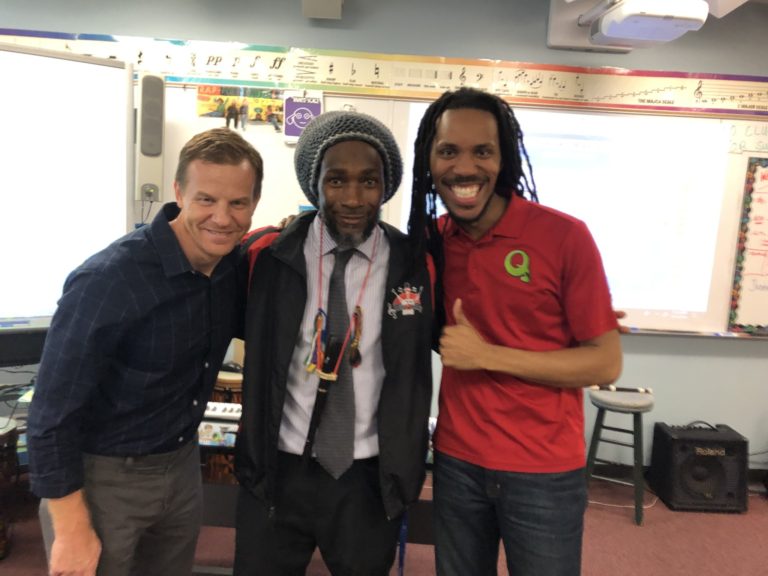
Dwayne Bass, Sean Smith, and Otto Gross in the Quaver studio. Photo Credit: Dwayne Bass
Quaver’s Sean Smith says he knew the visit would be powerful and productive before it even happened. He’d worked with both of them in the past and was already well aware of their talent and energy.
“I knew David and Dwayne were special and improvisational by seeing them in the classroom, and I wanted Quaver teachers to see more of this type of approach and success,” Smith says. “We really had no agenda. I was sure if I got five or six talented, brave musicians in a studio, something great would happen.”
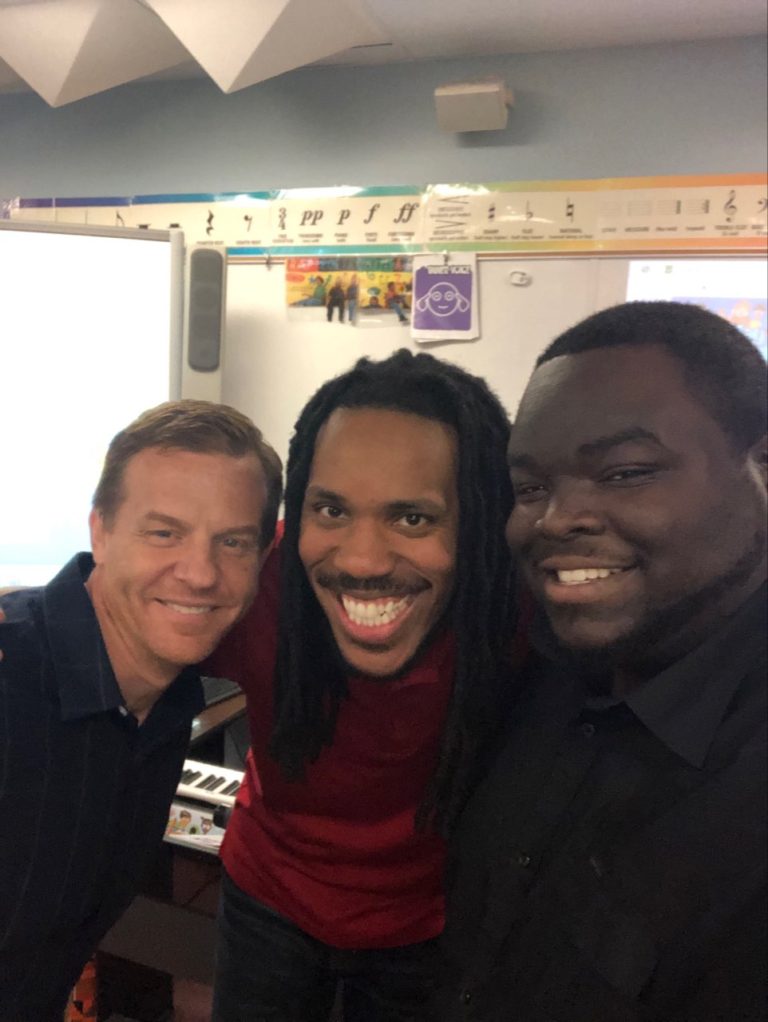
Gordon with Quaver’s Sean Smith and Otto Gross. Photo Credit: David Gordon
David Mastran, Quaver’s co-founder and President, remembers the energy that was generated the day of their visit.
Mastran, a musician himself who also helped develop the song’s lyrics, says, “This is what Quaver is all about: Excellence. Collaboration. Creating resources for teachers that will have a lasting impact on the lives of their students. We don’t just talk about these concepts. We make them happen.”
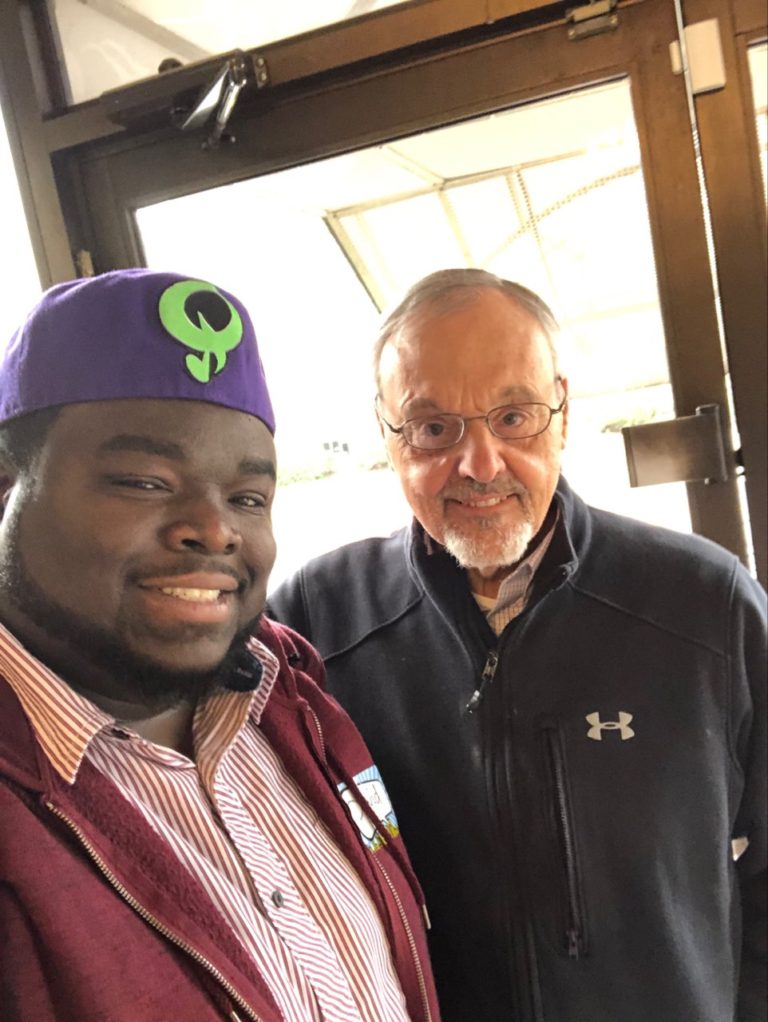
Quaver President and Co-Founder David Mastran and Gordon making music.
Bringing It Back to the Students.
When Gordon returned from Nashville, his students were waiting with joy and excitement, but also with something new: A strong sense of group pride, cultural connection and the positive energy that comes from feeling a sense of collective belonging.
The excitement overflowed and touched everyone.
“I went on the local news to talk about what we did in Nashville,” Gordon says. “My kids were so proud to know that we helped create that song! They love the song! They loved singing it and dancing to it. This is how history comes alive, through music.”
Gordon is quick to note that the MLK song doesn’t just celebrate black rights – it celebrates human rights. “Martin Luther King didn’t just fight for African-Americans, he was fighting for everyone. The song emphasizes who he was, the content of his character, his ability to break barriers … but it also celebrates each one of us.”
That Quaver helped make the creative dream become a reality is one that Gordon and Bass will not soon forget. But creativity, as we’ve seen in this case, requires a human heartbeat. On the day that, “He had a Dream,” was created in the Quaver studio, many hearts beat together as one.
“Everyone who came together that day to write that song came from a different background,” Gordon says. “But our combined backgrounds and our combined talents are all reflected in the song. The song itself represents just what Dr. King was talking about: content of character.”
How long did it take to create the song?
“About an hour,” Gordon answers in characteristic humility.
So in a single hour, an entire song way born. And with it, a fun, fresh, new way to celebrate and embrace Black History.
But this isn’t just history, as both Gordon and Bass have already taught us: This is life.
Dwayne Bass agrees: “Music is the key,” he says. “Music brings people together. On that special day, Quaver brought us all together. Music is what helped carry the civil rights movement forward, and music is what will motivate and encourage our students.”
Bass’s next three words sound more like a song of wisdom than a statement or a quote, because all of us can relate to it:
“Music is life.”
***
Kristin Clark Taylor is an award-winning author, journalist, and former White House communications strategist.

